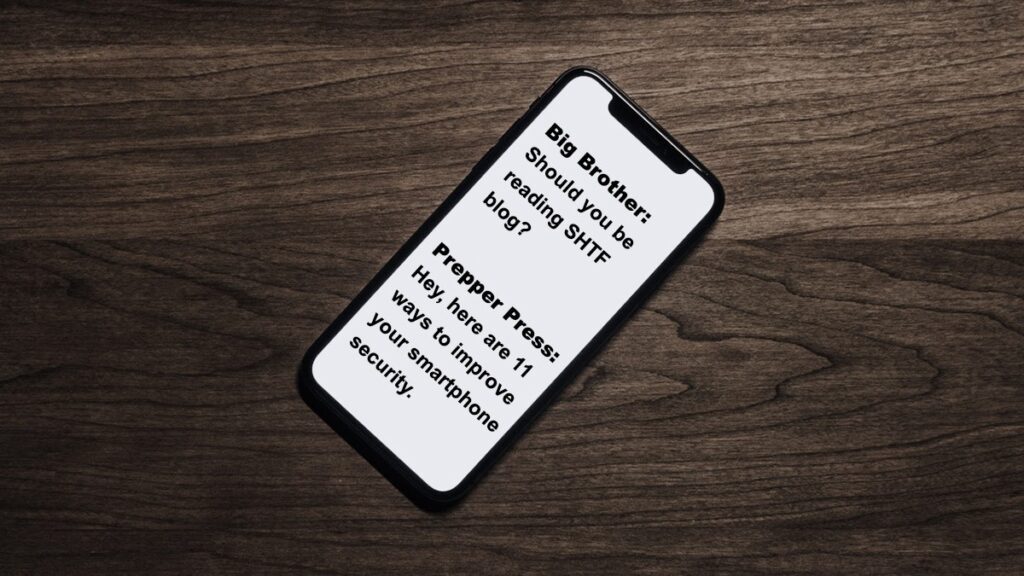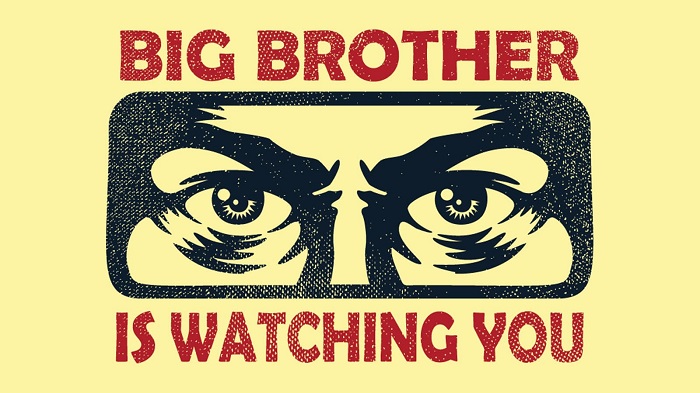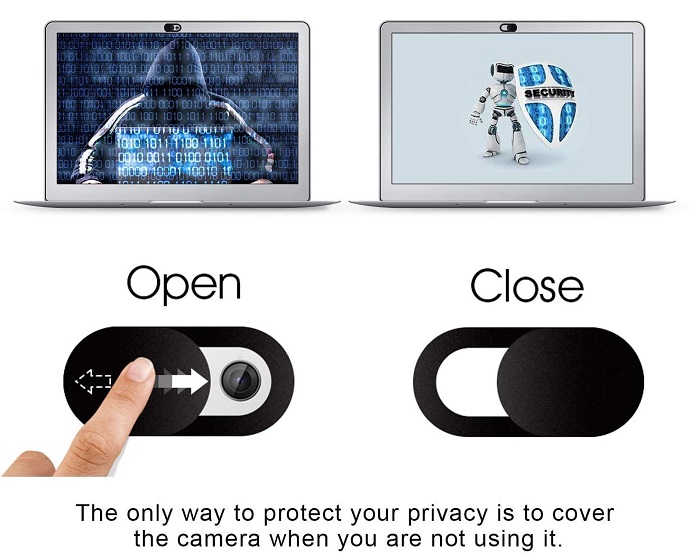
Once upon a time, if you told people that their phone was tracking them you were viewed as a conspiracy theorist. A nut job. Smartphone security is now a serious issue. Enough news headlines have come out since then that just about everybody understands that this is the case after all.
by Aden Tate, contributing writer and author of The Faithful Prepper
All is not lost, however. Following are 11 ways preppers can improve smartphone security making it more difficult for hackers to steal or monitor your personal data.
Big Brother is Watching You

Smartphones are Big Brother’s biggest dream come true. A portable tracking device that we carry with us throughout the entire day – never letting it out of sight – that we make a sizable portion of our purchases on, make the majority of our communications through, search the internet from, Google addresses, take our pictures from, and on and on.
Everything that someone could possibly want to know about you, all from something the size of a Poptart. Thankfully, smart phone privacy has grown to be something that once more has a grasp on the public’s minds, and as a result we’ve seen a great influx of privacy-protecting apps flood the market of late.
So if you’re somebody who doesn’t like the idea of having an unnamed Big Brother constantly peering over your shoulder to see what you’re up to, you may enjoy the following tips on how to improve your smartphone security.
#1 – Firechat
A meshnet – Firechat allows you to send encrypted texts which will bounce along other “nodes” in the meshnet until they reach their intended target. Nobody else can read the encrypted texts, and one of the beauties of Firechat is that it runs off of Bluetooth. That means that Firechat will work when you are in an area where you have no cell reception or internet. It’ll even work underground and in other areas where a cell phone signal typically wouldn’t travel, provided that there are other nearby nodes that can continue to bounce your message along.
#2 – TunnelBear
A virtual private network – or VPN, for short – TunnelBear will allow you to browse the internet without having to worry about servers tracking your search history. It’s a way to keep your anonymity while browsing online. I personally like to use a VPN anytime that I am searching conservative news sites or prepping related material. I don’t like the idea of Big Brother or anybody else for that matter slowly building a file on me that will let them know who I am.
This app allows you a certain amount of free memory per month until it shuts you off until the month resets. Otherwise, you’ll have to subscribe for one of the higher memory services that TunnelBear offers.
#3 – Camera Covers
Did you know that Mark Zuckerberg covers his laptop camera? That should tell you all you need to know.
Many people will cover their laptop cameras with a piece of electrician’s tape. A better solution is vinyl webcam stickers.
Neither is a great solution if you want to use your camera for legitimate purposes, however. Even worse, what if you want something for your smartphone that you are constantly using for pictures?
There is a much better solution. This nifty thing:

These little adhesive doodads can be used on computers, tablets, and even your smartphone. They will stick right around your smartphone’s camera where they can then be slid back and forth to cover the camera on your phone. A hacker can access a webcam – it’s not incredibly difficult – and it can be done without your ever knowing that it’s happening as well. If you’re somebody who likes to use their phone while on the toilet or before hopping into the shower, this may be a purchase that you’ll want to consider. They are really inexpensive and come packs. Buy them here.
#4 – Betternet
When my TunnelBear memory runs out, I like to switch to Betternet, another free VPN. Betternet actually gives you a set amount of hours per month that you can use their VPN for free. I find I’m often able to search for much longer than I am with TunnelBear as a result. If you consistently run over their monthly allotted time limit, there are subscription services that Betternet offers as well.
#5 – Viber
From what I understand, the stock messages app that comes with your phone allows your phone provider to be able to access your messages any time that they please, giving them the power to read your messages and see your sent/received pictures any time that they please as well. If you don’t like the idea of this, then I highly recommend utilizing Viber, and getting your friends to do so as well. Viber is an encrypted text messaging service that utilizes the internet to send your messages. Nobody should be able to read the messages that you send then other than you and the recipient.
Viber also participates in the Rakuten Chrome extension that automatically searches for online coupon codes, which can help you save money for preps. As of this writing, it’s an additional $1.50 off, but those savings add up.
You can set Viber so that it will automatically delete any messages older than 30 days as well. On top of all this, you can also utilize Viber for actual phone calls. Encrypted phone calls and encrypted messaging for your phone? That’s pretty hard to beat.
#6 – Turn off ‘Significant Locations’
This one is creepy as can be. Unless you request it not to, your phone will collect geocoordinates on you virtually all the time. On an iPhone go to:
Settings> Privacy> Location Services> System Services> Significant Locations
The bottom of your screen will then give you a list of your ‘significant locations’. Odds are you’ll see your house, work, grocer, gym, and other places that you visit frequently listed. If you click on one of your significant locations, you can then see for approximately how long you were at each on particular days.
You can turn it off, but I still wonder whether or not the smartphone is still collecting that data without my knowledge…
#7 – Quit Wearing Your Fitbit
A quality Fitbit is great for helping monitor and improve your health (talk about prepping!), but if there’s one thing that you probably don’t want Big Brother to add to your file, it’s your personal health, sleep, and exercise habits. Why on earth would you ever tell a stranger when you go to bed every night and for how long? Fitbit has allegedly discovered other, uh, “habits” that can happen at night as well. Supposedly, a woman found out her boyfriend was cheating by seeing an unexplained heart rate jump on his Fitbit at 4 a.m.
#8 – Tinfoil Hat Your Phone
You have heard of people making a tinfoil hat for their heads, but what about for your phone? Once upon a time, if you didn’t want your phone to be constantly pinging cell phone towers around you, allowing others to triangulate your position should they like, you could simply take the battery out of your cell phone. For smartphone security purposes, the battery is often embedded deep inside the phone, making this no longer an option. That means that your phone will act as a tracking beacon for you 24/7.
According to anti-hostage training company Captive Audience (read their book FMI), wrapping your phone in 4 layers of aluminum foil can keep this from happening. The aluminum foil can allegedly block the cell phone signal, keeping you from constantly pinging cell phone towers without having to constantly turn your phone on and off. (Source: page 287 of 365 Days of Survival: Foundational Critical Thinking and Skills for Personal Security.)
#9 – ViewExif
Unknown to many, anytime that you take a picture from your smartphone the GPS coordinates are automatically attached to the picture. It’s called being ‘geotagged’. If you then take those pictures and post them to social media, you very well could be announcing to the entire world the precise GPS coordinates of where you live, where you work, where your kid goes to school, where you currently are, etc.
That’s not a good idea.
ViewExif erases the metadata – the stuff that has your GPS coordinates – from photos, allowing you to add a layer of privacy to your photos. There’s a small charge to purchase the app (around $2), but the peace of mind that it can provide you makes it well worth the cost, if you ask me.
#10 – Protonmail
An encrypted email service, Protonmail is free and allows you to send and receive emails with the confidence that nobody other than your intended recipient will be able to access those emails. Given that emails seem to be a favorite reading source of Big Brother, there’s really no reason not to download Protonmail to your phone.
#11 – DuckDuckGo
I really don’t like the idea of my internet browser keeping track of everything that I’ve ever looked at either. It’s not that I’m looking at anything bad, but rather the principle of the thing. You may not do anything bad in your house, but you still close the curtains at night, right? It’s the same deal with my internet search history. Communists own Big Tech, and the smaller of a file that they’re able to compile on me from my search history, the better.
DuckDuckGo allows you to browse online without having to worry about your browser recording your search history. I’ve found what I’m actually searching for (typically conservative news) doesn’t get buried under a dozen pages of New York Times articles as well.
Final Smartphone Security Thoughts
Most everyone carries a smartphone with them at all times. For most of us, it may never leave our side. Don’t let yours become a portal for strangers to peer into the inner workings of your life. What are your thoughts? Have you found other ways to improve your phone security? Let us know in the comments what you’ve discovered!

2 comments
“#8 – Tinfoil Hat Your Phone” There are a number of companies that make anti-RFID bags for phones (and laptops) which completely block incoming and outgoing signals. Here’s an example on Amazon: https://amzn.to/3l5emxI Just drop the phone in the bag and no one can call in nor will the phone send any location signals or app data out. Of course, this means you probably can’t just shove the phone in your pocket as the bag takes up space. And if you’re expecting an important call, you can’t do this, either. But for all other times, this is better than tin foil and easier to use. You can also buy the fabric used for these bags itself and make your own covers.
That’s a neat product. Thanks for sharing!